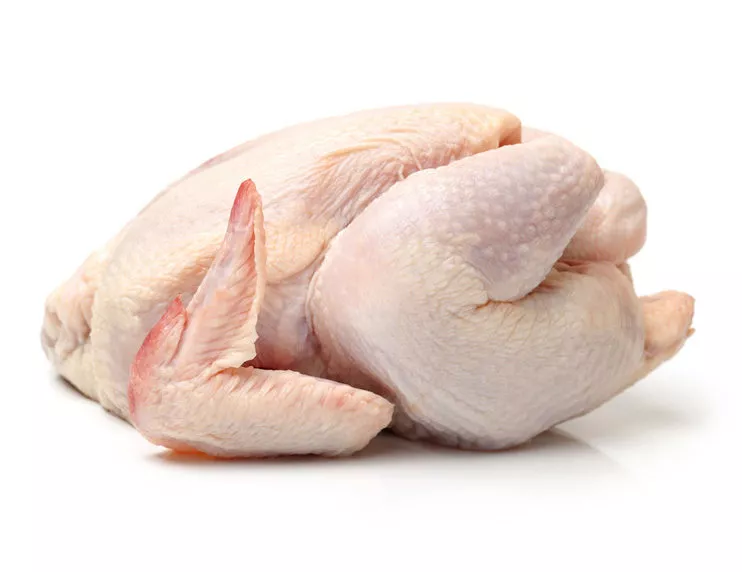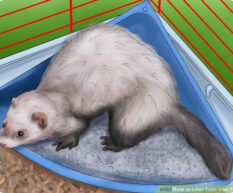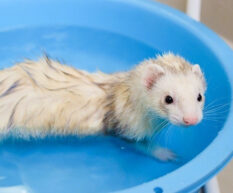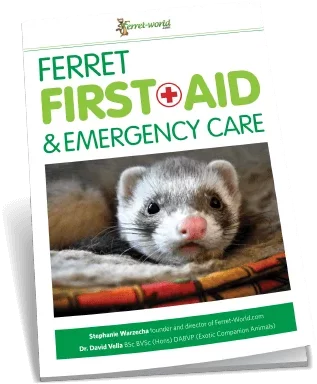Ferret News
Proper Handling and Preparation of Whole Prey and Raw Foods
By Sheryl Washburn

Since this month’s focus is on diet and food choices for our ferrets, we decided that it was important to go over safe handling instructions for raw and whole prey foods. When prepared properly, raw food items are a safe and nutritious source of food for your ferret. When not handled and prepared properly, they can have disastrous consequences for both you and your beloved fuzzy. This is because raw foods are a prime breeding ground for some scary types of bacteria, as well as some not-so-pleasant parasites. The same is true for any raw meat products that you would purchase for yourself; the difference is you cook your food. The whole point in feeding a raw or whole prey diet is to meet the nutritional requirements of your ferret; cooking the meat destroys many of those nutrients. Follow these tips to ensure a safe feeding process for both your ferret and your family.
Refrigerate Raw Foods at 40°F/4°C or Lower
If you’re ordering whole prey items online, check to ensure that they are still solid upon arrival, and that they did not spoil during shipping. Keep them frozen until you are preparing them for use. You can thaw them in the refrigerator overnight, or you can thaw them by placing them in a sealed plastic bag and covering it with cold water for about an hour. Some ferrets will even take food still frozen. If you purchase a prepared raw food, store it according to the manufacturer’s instructions. If you are preparing your own by purchasing meat from the grocery store, you will need to use the same precautions in storing and handling that you would with your own food.
Separate from Non-Raw Foods
Keep raw food items away from other items. Chances are you’ll be preparing these in the kitchen, where you prepare the food for your family as well, simply for convenience. If you can, make sure that you purchase a separate cutting board and knife that will be used only for feeding your ferret, if you will be preparing their food. This is important to prevent cross-contaminating your own food items.
Supervise your Ferret’s Feeding
It is highly recommended that you supervise your fuzzy while eating. This can be kind of disgusting for those with weak stomachs, but it’s important that you don’t let your ferret sneak off with some pieces of raw flesh, especially if you are feeding the ferret outside of a cage. As any ferret owner knows, they like to steal and hoard food. You also want to be nearby in the unlikely case that your animal has difficulty eating, especially when trying whole foods for the first time.
Feed Immediately after Thawing
You will want to feed any raw or whole prey items immediately after thawing. Allowing it to sit around for several hours at room temperature will increase the chances of bacterial growth. If you offer a thawed animal to your ferret and they aren’t interested, place it back in the refrigerator for a few hours and try again later, rather than leaving it out for many hours in case your ferret gets hungry. If they will still not eat it after you have offered it for the second time, then throw it away.
Dispose of Leftovers Promptly
Once your fuzzy is finished eating, remove any remaining bits of the carcass or leftovers immediately. The main reason is that you don’t want to leave a breeding ground for bacteria, or to attract flies (which lay maggots on the meat) and other insects. The secondary, yet no less important reason, is because your ferret may try to hide pieces of their meal for later. Unless you know all her hiding spaces, this can lead to some rather disgusting unintended odors in your home. A good tip is to keep a plastic baggie in your freezer where you can dispose of these scraps. Otherwise, your trash will begin to smell unpleasant. Take it out of the freezer and tie it up on the morning that your trash goes out, and you’ll have a much better time of it.
Clean All Utensils
Make sure that you are cleaning and properly sanitizing all utensils used in preparing food. Even if you’re just cutting open a plastic pouch with a dead mouse in it, you will want to make sure that the scissors are sanitized. A 30:1 mixture of bleach can work well, as well as many other household cleaners. If you use an automatic dishwasher, make sure that the water in it gets hot enough to sanitize items. Wipe down all surfaces where you will be preparing food for yourself, even if you don’t think there was any contact. It’s better to be safe than to spend the night hugging the toilet.
Wash Your Hand Before and After
Just like when handling raw meat products for human consumption, you will need to make sure that you wash your hands thoroughly, with hot, soapy water, for at least 30 seconds before and after handling any whole prey or raw food items. Remember that with whole prey, there is a higher chance that you will come in contact with leaked waste material from the animal. This is perfectly normal, but just something to be aware of. Raw food items generally have less risk of having waste on them, but they have much more exposed surface for bacteria to grow. Washing your hands is the best way to avoid accidentally ingesting dangerous organisms.
This article originally appeared in Dook Dook Ferret Magazine Issue 2. For information on how to receive 6 issues per year of the Digital Magazine + get extra bonuses please check out the Ferret-World Membership.




